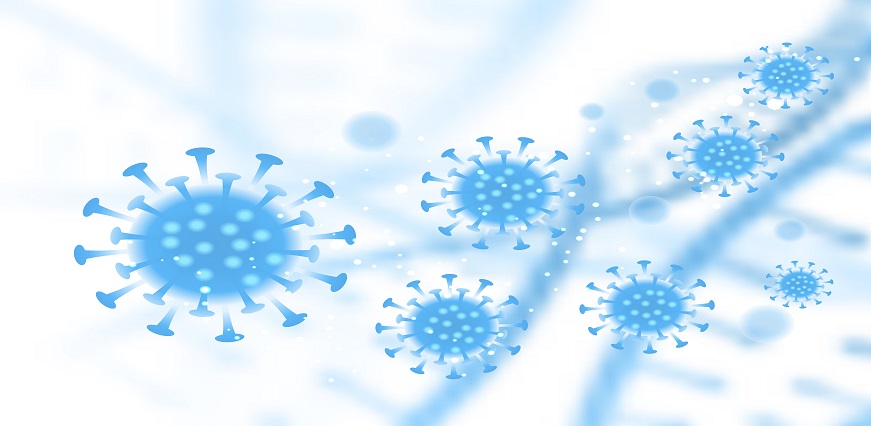





No lab centers are available in this city

Max Lab
May 16, 2023
Are you concerned about the H1N1 influenza virus and its potential impact on your health? With so much information circulating around the internet, it can be challenging to differentiate fact from fiction. Worry not! In this comprehensive blog post, we'll delve deep into the world of H1N1, discussing its various types, symptoms, prevention methods, risk factors, complications, diagnosis, causes, and treatment options associated with this notorious virus. So buckle up for an informative ride as we explore everything you need to know about the H1N1 influenza virus to stay informed and protected.
H1N1, commonly known as "swine flu," is an influenza virus that primarily affects pigs but can also infect humans. It emerged in 2009 and caused a global pandemic due to its novel nature and the population's general lack of immunity against it. The virus spreads through respiratory droplets when an infected person coughs, sneezes, or talks. It can also spread by touching contaminated surfaces and then touching the mouth, nose, or eyes.
H1N1, also known as swine flu, is a type of influenza virus that has various subtypes.
H1N1pdm09: The first subtype was H1N1pdm09, which caused a pandemic in 2009. This subtype is commonly referred to as "swine flu" and spreads from person to person through respiratory droplets.
Classical Swine Flu (cH1N1): Another subtype of H1N1 is the classical swine flu (cH1N1). This strain has been circulating among pigs for decades and can occasionally infect humans who are exposed to infected pigs or their environments. Although cH1N1 rarely causes severe illness in humans, it can still spread from person to person.
Avian-Like Swine Influenza Viruses (SIVs): These viruses have genetic components from both avian and human influenza viruses and can cause mild to moderate disease in humans.
H1N1 influenza virus is known to cause symptoms that are similar to those of seasonal flu. These symptoms can range from mild to severe and can lead to complications if left untreated.
Common Symptoms Include:
Chills
Symptoms of H1N1 typically appear within 2-3 days after exposure, but it can take up to 7 days before an individual starts experiencing them. This makes it difficult for people who have been exposed but are not showing any symptoms yet to know if they are infected with the virus.
H1N1 is caused by a strain of the influenza A virus that originated from a combination of swine, bird, and human flu viruses. The virus mutates frequently, making it difficult for the immune system to recognize and combat it effectively. The primary cause of transmission is through direct contact with infected individuals, inhalation of respiratory droplets, and contact with contaminated surfaces.
Preventing the H1N1 influenza virus is essential to avoid getting infected. One of the most effective ways to prevent it is by getting vaccinated against the flu every year. The vaccine can reduce your risk of getting sick and spreading it to others.
Apart from vaccination, practicing good hygiene habits can also help in preventing H1N1:
Washing hands with soap and water for at least 20 seconds or using an alcohol-based hand sanitizer regularly can decrease the spread of germs.
Covering your mouth when coughing or sneezing with a tissue or elbow can also minimize transmission.
Avoid touching your face as much as possible since viruses often enter through our eyes, nose, and mouth.
Staying away from infected individuals can prevent catching the virus. If you're feeling unwell yourself, stay home until you feel better so that you don't spread any germs around.
Diagnosing H1N1 influenza virus requires laboratory testing. Healthcare professionals use various methods to confirm an H1N1 infection, including:
Rapid Influenza Diagnostic Tests (RIDTs): These tests can detect influenza viruses in 15 minutes but may not always be accurate.
Reverse Transcription Polymerase Chain Reaction (RT-PCR) Tests: These tests are more reliable and can identify specific strains of influenza, including H1N1.
Viral Culture Tests: This method involves growing the virus in a laboratory to confirm its presence but takes longer to yield results.
Early diagnosis is crucial for effective treatment and preventing the spread of the virus to others.
When it comes to H1N1 influenza virus, certain factors may increase the chances of getting infected. These risk factors include age, occupation, and underlying medical conditions.
Age: Elderly people and children under 5 years old are more susceptible to contracting the virus due to weaker immune systems.
Occupation: Healthcare workers and individuals working in close quarters, such as schools or daycare centers, have an increased risk of exposure to the virus.
Medical Conditions: Individuals with asthma, diabetes, heart disease, or weakened immune systems are at higher risk of severe illness from H1N1.
Complications of H1N1 influenza virus can be serious and sometimes life-threatening. They are more likely to occur in high-risk groups, such as young children, pregnant women, older adults, and those with pre-existing medical conditions.
Possible Complications:
Pneumonia: A common complication caused by lung inflammation due to the virus.
Respiratory Failure: The lungs may fail to provide sufficient oxygen to the body, requiring hospitalization.
Worsening of Existing Conditions: H1N1 can exacerbate asthma, heart disease, and other chronic conditions.
Secondary Infections: Increased risk of bacterial infections such as sinusitis, ear infections, or bronchitis.
While most mild cases of H1N1 can be managed at home with rest and fluids, antiviral medications may be prescribed in severe cases.
Treatment Options:
Over-the-Counter Medications: Pain relievers can help alleviate fever and body aches.
Hydration and Rest: Drinking plenty of fluids and getting adequate rest are essential for recovery.
In summary, the H1N1 influenza virus is a highly contagious respiratory illness that can lead to severe complications and even death. It has affected millions of people worldwide and continues to be a health concern.
Prevention measures such as vaccination, hand hygiene, and avoiding close contact with sick individuals are crucial in reducing the spread of the virus. However, it is essential to recognize symptoms early, seek medical diagnosis, and start treatment promptly to minimize the risk of severe complications. Staying informed and taking appropriate precautions can help protect you and your loved ones from H1N1.





The early symptoms of H1N1 include fever, cough, sore throat, body aches, fatigue, chills, and headache. Some individuals may experience vomiting and diarrhea.
Antiviral medications are effective when taken within 48 hours of symptom onset. Supportive care, such as hydration, rest, and fever management, also helps in recovery.
Influenza is diagnosed using an RT-PCR test, rapid antigen test, or viral culture from a nasal or throat swab.
Influenza is caused by the influenza virus, classified into A, B, C, and D types, with A and B being most common in humans.
Prevention includes annual flu vaccination, frequent handwashing, avoiding close contact with sick individuals, and maintaining good respiratory hygiene.












Sign up takes less than 60 secs and gives you access to your offers, orders and lab tests.
Looks like you are not registered with us. Please Sign up to proceed
OTP will be sent to this number by SMS
We have successfully received your details. One of the agents will call you back soon.
 To reach our help desk call 9213188888
To reach our help desk call 9213188888
No Lab Centers are available in this city
Looks like you are not registered with us. Please Sign up to proceed
OTP will be sent to this number by SMS
Not Registered Yet? Signup now.Looks like you are not registered with us. Please Sign up to proceed





 7982100200
7982100200.png)
Comments